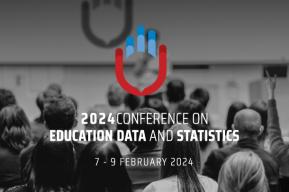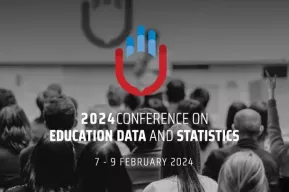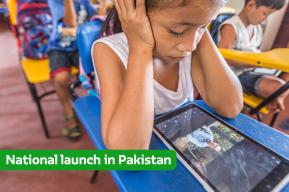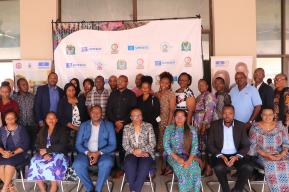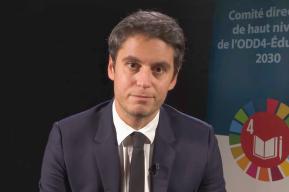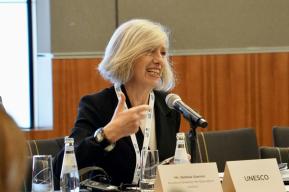News
More than 3.7 million migrant children at risk of missing out on school
The campaign "Education without limits: I learn here or there" seeks to highlight the educational crisis experienced by children and adolescents in context of human mobility in Latin America and the Caribbean.

Panama, 29 March 2023. As a result of poverty and high rates of violence in Latin America and the Caribbean, around 3.7 million children and adolescents are displaced or on the move in search of better opportunities and access to basic services. In this search, migrants are forced to interrupt their studies and face multiple barriers to continue their learning, whether in transit or host countries.
In response to this problem, the Regional Education Group for Latin America and the Caribbean , made up of Save the Children UNICEF, UNESCO, Plan International and other organizations, launched the campaign "Education without limits: I learn here or there". The campaign seeks to highlight the educational crisis experienced by children and adolescents in a situation of mobility, to promote that they access and stay in school, and to show how their access to education can positively impact a host community.
This campaign is part of the activities carried out under the Refugee and Migrant Response Plan (RMRP), supported by the Regional Chapter of the Multi-Year Resilience Program (MYRP) of the Education Cannot Wait (ECW) Fund and is supported by the Government of Canada.
The "Education without limits: I learn here or there" campaign will have resources and tools aimed at providing children, adolescents and their families, host communities, teachers, and educational personnel with accurate information on educational pathways, resources, mechanisms, and protocols available for children and adolescents in a situation of mobility to continue learning in the region.
Victoria Ward, Save the Children's Regional Director for Latin America, and the Caribbean, said: "The Education without limits campaign comes at a key moment when migratory movements in the region have increased exponentially. Every day, thousands of children and adolescents are in a mobility situation, facing multiple challenges, including access to education. With this campaign we seek to
promote access to and permanence in education as a human right for children and adolescents who migrate".
"In Latin America and the Caribbean, one in five refugees or migrants is a child. They had to leave their schools, but when they crossed borders, many did not have the opportunity to keep learning and found themselves trapped in exclusion, poverty, and violence. The campaign we are launching today seeks to break this vicious cycle through education. The most vulnerable children fleeing their countries can contribute to the development of transit and host communities, but only if they have access to more inclusive and quality education services," said Garry Conille, UNICEF Regional Director for Latin America, and the Caribbean.
Claudia Uribe, Director of the Regional Bureau of Education for Latin America and the Caribbean (OREALC/UNESCO Santiago) stressed that "The region must spare no effort to remove any obstacle that prevents any child in a situation of mobility from fully integrating into the national education systems in their host countries".
"Girls and adolescents represent about 20% of the flow of female human mobility in the region, facing additional barriers to access education due to the responsibilities and roles assigned to girls and women in households, gender-based violence, child and adolescent pregnancies, and early marriages and unions are exacerbated in crisis situations, hindering their access to education, their learning processes, quality, transition and educational completion," said Debora Cobar - Regional Director of Plan International for Latin America and the Caribbean.
....
Join Education Without Limits: I learn here or there by sharing the campaign messages and graphics? with the tags: #EducationWithoutLimits #EducationIsARight #EducationSavesLives.
For more information contact:
María Gabriela Alvarado
LAC Regional Media Coordinator
WhatsApp +507 6205-2366 / maria.alvarado@savethechildren.org
Save the Children Latin America and the Caribbean
Save the Children
Save the Children is an international organization present in more than 120 countries. To ensure that children and adolescents have a better future, we work every day to guarantee children's rights to health, education, and protection from violence. We make sure their needs are met and their voices are heard. We do whatever it takes for children and adolescents, every day and in times of crisis, to transform their lives and the future we share.
UNICEF
UNICEF works in some of the most difficult places to reach the world's most disadvantaged children. In 190 countries and territories, we work for every child, everywhere, every day, to build a better world for all.
Plan International Americas
It is a humanitarian and development organization that promotes the rights of children, adolescents, and equality for girls. It has no political, religious, or governmental affiliation. Plan International was founded in 1937 and operates in more than 70 countries around the world. In Latin America and the Caribbean, we work with children, youth, and families in 13 countries through programs and community projects for the empowerment of rights and the promotion of gender equality.
UNESCO
The Regional Bureau of Education for Latin America and the Caribbean (OREALC/UNESCO Santiago) was created in 1963 to support Member States in improving their education systems. Its mission is to lead, monitor and provide technical support to the countries of the region through each of its lines of action to advance towards the fulfillment of Sustainable Development Goal 4 - Education 2030. In addition, this office serves as UNESCO's national representation in Chile.


